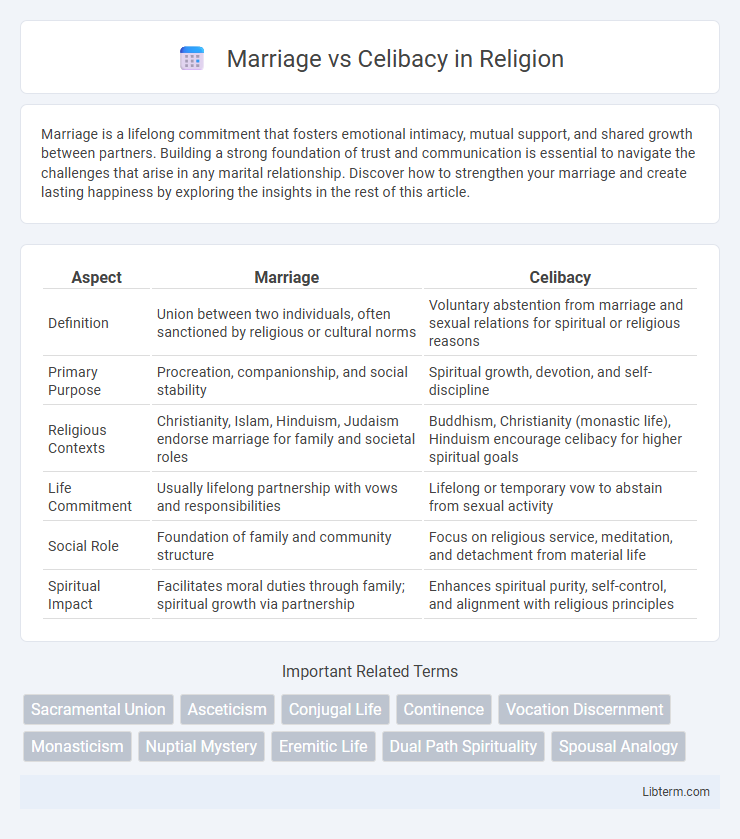Marriage is a lifelong commitment that fosters emotional intimacy, mutual support, and shared growth between partners. Building a strong foundation of trust and communication is essential to navigate the challenges that arise in any marital relationship. Discover how to strengthen your marriage and create lasting happiness by exploring the insights in the rest of this article.
Table of Comparison
| Aspect | Marriage | Celibacy |
|---|---|---|
| Definition | Union between two individuals, often sanctioned by religious or cultural norms | Voluntary abstention from marriage and sexual relations for spiritual or religious reasons |
| Primary Purpose | Procreation, companionship, and social stability | Spiritual growth, devotion, and self-discipline |
| Religious Contexts | Christianity, Islam, Hinduism, Judaism endorse marriage for family and societal roles | Buddhism, Christianity (monastic life), Hinduism encourage celibacy for higher spiritual goals |
| Life Commitment | Usually lifelong partnership with vows and responsibilities | Lifelong or temporary vow to abstain from sexual activity |
| Social Role | Foundation of family and community structure | Focus on religious service, meditation, and detachment from material life |
| Spiritual Impact | Facilitates moral duties through family; spiritual growth via partnership | Enhances spiritual purity, self-control, and alignment with religious principles |
Understanding the Concepts: Marriage and Celibacy
Marriage is a legally or socially recognized union between individuals that establishes rights and responsibilities, often centered around companionship, procreation, and mutual support. Celibacy refers to the voluntary choice to abstain from marriage and sexual relations, frequently for spiritual, religious, or personal reasons. Both concepts shape lifestyle and identity through distinct commitments--marriage emphasizing partnership and family, celibacy promoting self-discipline and often spiritual focus.
Historical Perspectives on Marriage and Celibacy
Historical perspectives on marriage reveal its evolution as a social contract central to inheritance, alliance-building, and religious rituals across cultures, with ancient civilizations like Mesopotamia formalizing marital laws. Celibacy has been traditionally embraced in various religious contexts, especially within Buddhism, Christianity, and Hinduism, symbolizing spiritual dedication and self-discipline. Over centuries, societies balanced marriage and celibacy by delineating roles for both family lineage continuity and individual spiritual pursuits.
Psychological Benefits of Marriage
Marriage often contributes to improved mental health by providing emotional support, reducing stress levels, and fostering a sense of belonging. Studies show married individuals experience lower rates of depression and anxiety due to consistent companionship and shared life goals. The psychological benefits stem from stable social connections and enhanced resilience against life's challenges.
Emotional Rewards of Celibacy
Celibacy offers profound emotional rewards, including increased self-awareness, inner peace, and emotional resilience. Individuals practicing celibacy often experience heightened clarity and a stronger sense of personal fulfillment without the emotional complexities that can accompany marriage. This lifestyle choice fosters deep introspection and emotional independence, enhancing overall mental well-being.
Social and Cultural Influences
Marriage and celibacy are deeply shaped by social and cultural influences that define individual roles and community expectations. In many cultures, marriage is viewed as a social contract essential for family lineage, economic stability, and social cohesion, while celibacy is often linked to religious devotion, personal discipline, or social status within certain communities. Cultural narratives and social norms continue to influence perceptions and practices surrounding these life choices, affecting legal rights, social acceptance, and personal identity.
Health Impacts: Marriage vs Celibacy
Marriage is associated with numerous health benefits, including lower rates of cardiovascular disease, improved mental health, and increased longevity due to emotional support and shared healthy behaviors. Celibacy can reduce risks related to sexually transmitted infections and may provide mental clarity and stress reduction for some individuals. Studies indicate that while married individuals often experience better overall physical health, celibacy offers distinct psychological and physical advantages depending on personal lifestyle and choices.
Economic Implications of Marital Status
Marital status significantly impacts economic stability and wealth accumulation, with married individuals often benefiting from dual incomes, shared expenses, and tax advantages. Celibate individuals may face lower household costs but lack access to financial benefits tied to marriage, such as spousal social security benefits and health insurance coverage. Research indicates married couples typically exhibit higher net worth and improved credit access compared to their single or celibate counterparts.
Religious and Spiritual Aspects
Marriage is often regarded in many religions as a sacred union that fosters spiritual growth, community bonding, and fulfillment of divine duties, exemplified by Christian sacraments and Hindu dharma. Celibacy, embraced in Buddhism and Catholicism, is seen as a path to spiritual purity, self-discipline, and detachment from worldly desires, enhancing meditation and enlightenment. Both paths hold distinct religious significance, reflecting diverse approaches to achieving spiritual fulfillment and divine connection.
Challenges and Misconceptions
Marriage often faces challenges such as communication breakdowns, financial stress, and balancing personal growth with shared responsibilities, while misconceptions include the belief that marriage guarantees happiness or stability. Celibacy is frequently misunderstood as a suppression of natural desires or social isolation, despite its potential for personal clarity, spiritual growth, and enhanced focus on goals. Both paths require deliberate choices and self-awareness to navigate societal pressures and internal expectations.
Choosing the Path: Personal Considerations
Choosing between marriage and celibacy involves evaluating personal values, life goals, and emotional readiness. Marriage often fulfills desires for companionship, family building, and social connection, while celibacy can offer freedom for spiritual growth, self-discovery, and focused career development. Individual priorities, cultural background, and long-term aspirations critically shape this deeply personal decision.
Marriage Infographic

 libterm.com
libterm.com